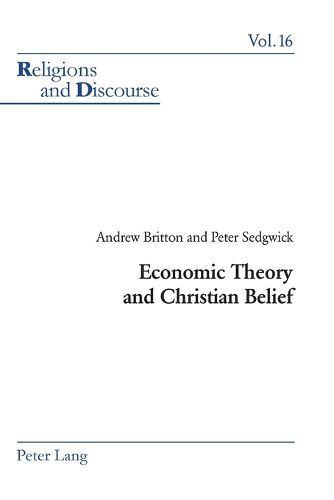Readings Newsletter
Become a Readings Member to make your shopping experience even easier.
Sign in or sign up for free!
You’re not far away from qualifying for FREE standard shipping within Australia
You’ve qualified for FREE standard shipping within Australia
The cart is loading…






This title is printed to order. This book may have been self-published. If so, we cannot guarantee the quality of the content. In the main most books will have gone through the editing process however some may not. We therefore suggest that you be aware of this before ordering this book. If in doubt check either the author or publisher’s details as we are unable to accept any returns unless they are faulty. Please contact us if you have any questions.
Any attempt to use the Bible as a basis for addressing contemporary economic issues needs to recognise the fundamental differences in underlying philosophy between economic theory and Christian belief. Neo-classical economic theory embodies a view of the world and of human nature, derived from the Enlightenment of the eighteenth century, which has become immensely influential in recent times. ‘Economic man’ is a rational, independent being, set in an environment of scarcity, but able to improve his welfare by transactions in a market economy. This ‘anthropology’ is explained and examined systematically in this book, following broadly the pattern of an economics textbook, and drawing on some recent work in methodology. In each chapter, a second part presents a contrasting view of the same subject matter drawn from the Bible as interpreted by contemporary scholars. This gives a radically different account of human life and well-being, centred on the community and its relationship with God, in which prosperity, abundance and hope for the future are divine blessings and gifts. Despite the wide gaps between economic theory and Christian belief some points of contact can be made, and there are suggestions as to how a dialogue between them might be conducted.
$9.00 standard shipping within Australia
FREE standard shipping within Australia for orders over $100.00
Express & International shipping calculated at checkout
This title is printed to order. This book may have been self-published. If so, we cannot guarantee the quality of the content. In the main most books will have gone through the editing process however some may not. We therefore suggest that you be aware of this before ordering this book. If in doubt check either the author or publisher’s details as we are unable to accept any returns unless they are faulty. Please contact us if you have any questions.
Any attempt to use the Bible as a basis for addressing contemporary economic issues needs to recognise the fundamental differences in underlying philosophy between economic theory and Christian belief. Neo-classical economic theory embodies a view of the world and of human nature, derived from the Enlightenment of the eighteenth century, which has become immensely influential in recent times. ‘Economic man’ is a rational, independent being, set in an environment of scarcity, but able to improve his welfare by transactions in a market economy. This ‘anthropology’ is explained and examined systematically in this book, following broadly the pattern of an economics textbook, and drawing on some recent work in methodology. In each chapter, a second part presents a contrasting view of the same subject matter drawn from the Bible as interpreted by contemporary scholars. This gives a radically different account of human life and well-being, centred on the community and its relationship with God, in which prosperity, abundance and hope for the future are divine blessings and gifts. Despite the wide gaps between economic theory and Christian belief some points of contact can be made, and there are suggestions as to how a dialogue between them might be conducted.